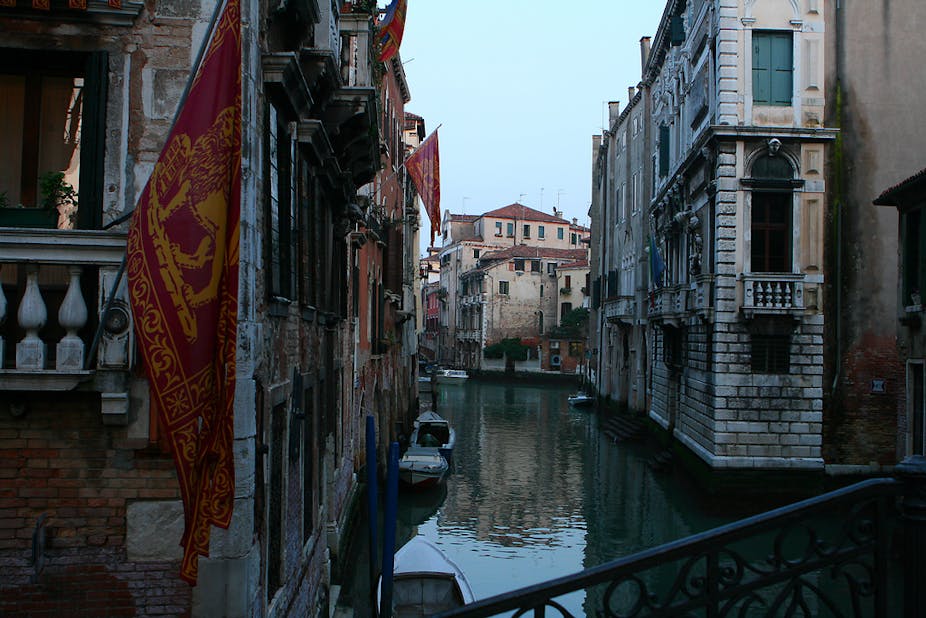Just as Venice risks disappearing beneath its waters, it is making a remarkable political reappearance. The Venetian Republic existed for more than 1000 years until it came to an end at the hands of Napoleon Bonaparte in 1797, but earlier this month, 89% of voters in the Veneto region voted to bring the republic back and declare independence from Italy.
Organisers said 63% of the 3.7 million eligible voters turned out. The Italian national government in Rome did not recognise the poll.
The Venetian referendum comes as issues of self-determination are prevalent in European politics. In the recent referendum in Crimea, 93% voted for the autonomous region of Ukraine to declare independence and join Russia instead. A vote on Scottish independence will take place in September, while a poll on independence in Catalunya may also go ahead in November.
Together, these cases generate two important political considerations for the international community. One is the tension between self-determination and territorial integrity. The other is the place of referendums in making important and binding decisions.
The right to self-determination is enshrined in the United Nations Charter. This principle sought to establish the right of people to live free from foreign domination – that is, governed by one’s own people. The principle of territorial integrity emerged to prevent the chaotic and endless division of states along national, linguistic and religious lines.
Both principles have merit and yet both need to be treated with caution. Upholding territorial integrity may help prevent international tensions. Domestically, though, it can doom individuals to continued existence under repressive regimes, like in Iraq under Saddam Hussein, or the unstable, life-threatening absence of government, as in Somalia.
Similarly, national self-determination may help a people escape repression, but it too generates problems of where to draw new boundaries and the creation of new minorities. And this is to say nothing of the chance that rule by one’s own people could be far more repressive than that of previous rulers: think Indonesia under Suharto.
This leads us to consider how important matters such as national self-determination and territorial integrity might be best decided.
Referendums and plebiscites have been part of modern democratic life since the 19th century. They are seen as ways of determining the popular will on discrete issues. Their great advantage was to be seen as a device that could circumvent vested interests that, so the critique went, had corrupted politics and distanced it from the true source of its legitimacy, the citizen.
Yet at the same time referendums and plebiscites could be ultimately anti-democratic. They were used by autocratic leaders, such as Napoleon III and Charles de Gaulle, to circumvent checks on the exercise of their power. They were also used to undermine democratic regimes, like Weimar Germany, in favour of leaders promising strong government. When it comes to referendums we must be careful what we wish for.
And at this stage, it is time for a bit of healthy cynicism: one rarely proposes a referendum that one won’t win. Referendums can be used to secure post-facto popular endorsement of decisions already made elsewhere. As we’ve seen in Crimea, a referendum can give a seemingly democratic veneer to undemocratic actions.
All of this leads us back to this year’s referendums on self-determination. The political process in which they emerge becomes the key to their legitimacy.
The Venetian referendum may be an admirable exercise in political mobilisation at a time when interest in political participation is in decline. However, it comes in a context of increasing tensions between the north and the south in Italy: the richer north seeking to divest itself of the poorer south.
If the nation-state exists for anything it must exist for redistributive politics. A common nationality or identity plays an important part in making that redistribution legitimate.

The Venetian vote, like the proposed Catalan one, will not be recognised by the central government. Perhaps this has some unintended merit.
Referendums might not necessarily be the best tool for gauging considered, popular opinion, exposing citizens directly to powerful political interests. If this is the case, it might be best for all referendums to be advisory rather than binding. They can be powerful statements that governments ignore at their peril.
In Crimea, the vote on joining Russia can hardly be described as having been conducted in an impartial manner. The presence of unidentified, armed men and the lack of free and balanced information should lead us to be sceptical of the result and the stated levels of turnout.
In comparison, the forthcoming referendum in Scotland looks pretty good. The issue of independence has been bubbling away in Scottish politics for some decades now.
To the Scottish National Party’s credit, it has called a referendum on an issue on which it probably won’t win. To the British government’s credit, it will recognise the result of the vote even though it doesn’t technically have to. Whatever the result, the vote will serve as the basis for further negotiation of Scotland’s place within the United Kingdom.
Overall, we must be cautious in attempting to resolve the tension between national self-determination and territorial integrity in international politics via referendums.
When the process is sound and the context democratic, referendums are legitimate forms of political expression. In the absence of that process and context, they can provide the exercise of realpolitik with a smiling democratic mask.

